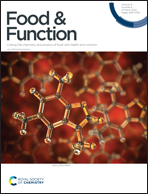Probiotic strains alleviated OVA-induced food allergy in mice by regulating the gut microbiota and improving the level of indoleacrylic acid in fecal samples†
Abstract
Food allergy (FA) is a common immune disorder caused by food antigens. Probiotic strains showed alleviating effects on FA, such as the alleviation of FA pathological symptoms, serum OVA-sIgE levels, and the gut microbiota diversity and composition. The results showed that intragastric administration of Lactiplantibacillus plantarum CCFM1189, Limosilactobacillus reuteri CCFM1190, and Bifidobacterium longum CCFM1029 alleviated the weight loss and FA pathological symptoms of FA mice and decreased OVA-specific IgE and histamine (HIS) levels. CCFM1189 and CCFM1190 decreased IL-4, IL-5, and IL-13 levels, while CCFM1189 and CCFM 1029 decreased IL-17 levels. The gut microbiota analysis demonstrated that CCFM1189 increased the abundance of Akkermansia, while CCFM1190 improved immune regulation bacteria such as Faecalibaculum. CCFM1029 increased Bifidobacterium and the bacteria involved in short-chain fatty acid (SCFA) production, such as Dubosiella. L. plantarum CCFM1189 and L. reuteri CCFM1190 improved indoleacrylic acid levels in mouse fecal samples using untargeted metabolomics analysis. In conclusion, CCFM1189, CCFM1190, and CCFM1029 decreased Th2 immune responses and alleviated FA pathological symptoms by regulating the gut microbiota diversity and composition, and altering gut microbial metabolites, which could provide support in clinical tests and probiotic production in the future.



 Please wait while we load your content...
Please wait while we load your content...